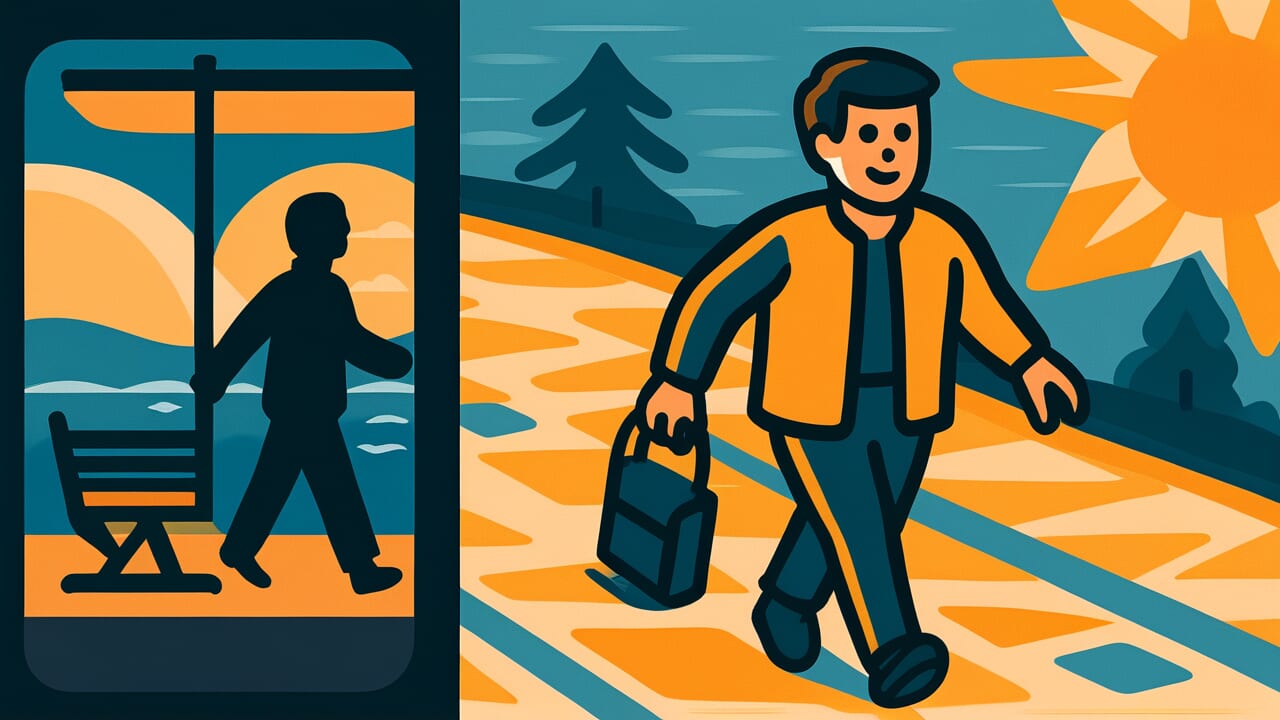How to Read “In summer walk in the sun, in winter walk in the shade”
Natsu wa hinata wo ike, fuyu wa hikage wo ike
Meaning of “In summer walk in the sun, in winter walk in the shade”
This proverb teaches that you should choose appropriate actions according to the season. Walk in the hot sun during summer and in the cold shade during winter.
At first, this advice seems unreasonable. But it doesn’t mean seeking easy comfort. Instead, it means making the best choice for each situation.
People use this saying when someone focuses only on immediate ease or comfort. It reminds them to judge things from a long-term perspective.
For example, when facing a difficult challenge, don’t avoid it. Take it on actively and grow from the experience. This is the context where this proverb applies.
Today, people quote this expression when discussing flexible judgment or the courage to choose harder paths. Modern society often seeks only comfort.
This proverb reminds us that sometimes accepting inconvenience or difficulty is important. It continues to hold value in our comfortable world.
Origin and Etymology
No clear written records explain the origin of this proverb. However, the structure of the phrase offers interesting insights.
First, notice that this teaching sounds paradoxical. Walk in the sun during hot summer and in the shade during cold winter.
From a modern perspective, this seems strange. Why would anyone do this?
This proverb likely reflects traditional Japanese health wisdom. During the Edo period, people valued adapting the body to seasonal climates.
If you only seek cool places in summer, you become more prone to summer fatigue. If you stay only in warm places in winter, your resistance to cold weakens.
This teaching probably came from such practical experience. It’s not just about health methods.
The proverb also carries life lessons. Don’t always choose the easy path. Place yourself in harsh environments to train your mind and body.
This spirit connects to the samurai code. Rural communities may have passed down this wisdom about seasonal work too.
Either way, this teaching contains the wisdom Japanese people developed through their long relationship with nature.
Usage Examples
- New employees should experience tough field work rather than easy departments. As they say, in summer walk in the sun, in winter walk in the shade.
- My child wants to avoid difficult subjects, but maybe I should encourage them to face these challenges. In summer walk in the sun, in winter walk in the shade, after all.
Universal Wisdom
This proverb has been passed down because it understands human weakness and growth. We instinctively seek comfort and avoid pain or discomfort.
When it’s hot, we want cool places. When it’s cold, we want warm places. This is a natural survival instinct.
But our ancestors realized something important. A life that only pursues comfort actually makes people weaker.
Muscles weaken without stress. Similarly, the spirit doesn’t strengthen if it stays only in comfort. Exposing yourself to summer heat builds heat tolerance.
Experiencing winter cold creates resistance to cold. This truth applies to every aspect of life, not just physical health.
The proverb has a deeper meaning too. It teaches the importance of judgment: doing what’s necessary now.
Don’t let immediate feelings of comfort or discomfort control you. Look at the long term. Determine what you truly need.
Have the courage to make tough choices according to each situation. People naturally want to choose easy paths.
That’s exactly why the wisdom to deliberately choose difficult paths has value across generations.
When AI Hears This
Maintaining body temperature always requires energy. This act goes against the second law of thermodynamics.
Left alone, body temperature approaches ambient temperature and life stops. Here’s what’s notable: this proverb doesn’t say “choose comfortable environments.” It says the opposite.
Walking in the sun during summer makes your body fight heat through sweating and blood vessel dilation. Walking in shade during winter makes your body fight cold through heat production and blood vessel constriction.
In other words, deliberately increasing the temperature difference with your environment actively engages your body’s regulatory functions. This connects to the “hormesis effect.”
Moderate stress activates biological functions and trains the homeostasis system. Modern people use air conditioning to stay at comfortable temperatures constantly.
But this puts temperature regulation functions to sleep. When facing temperature changes, the body can’t respond properly.
This proverb teaches that life must use environmental gradients to activate metabolism to resist entropy increase. The pursuit of comfort actually causes biological system decline.
Here lies the paradox.
Lessons for Today
This proverb teaches modern people the importance of discerning “what do I need right now?” We can obtain comfortable environments with just a smartphone.
Perhaps that’s exactly why we need the courage to deliberately choose inconvenience or difficulty.
In career development, choosing only easy work won’t help you grow. Sometimes challenge yourself with tough projects. Accept the risk of failure.
This is how you gain real ability. The same applies to relationships.
Seeking only comfortable relationships won’t create deep connections. Sometimes experiencing disagreements or conflicts builds stronger bonds.
The key isn’t blindly seeking hardship. Calmly assess each situation. Judge what you need for your growth.
Then, even if it’s a difficult path, have the courage to take that step. This flexible and positive attitude gives you strength to survive in our rapidly changing society.
Starting today, why not make the best choice for your future self, not just immediate comfort?



Comments